The Place: Casa Brasil Coffees
The Cup: A delicious pour-over made with the 5th place winner of the best coffee in Brazil. Lucky me! And, an emerging, though not yet mainstream, potential coffee trend (remember, you heard it here first) TEA – made from the pods that housed the coffee beans before they were processed. Try as I might, I’ve never really been a big fan of tea. So I was willing, but not exactly eager to give it a shot. I found myself completely surprised by how delicious and flavorful the “tea” was. Sweet, caramel in color and undertones, and refreshing. I’d order it. Well, only if there wasn’t coffee available, or if it was after 4pm – my coffee cut-off.
Background: I heard about Joel from Cup 29, Kristin Sheppard who had been on an Up and Down Tour and LOVED it. The tour was on my radar, then I somehow forgot all about it until a few weeks ago when one of my real estate agent pals, Adrienne, discovered my blog and said she had the perfect stranger for me to meet – her buddy Joel. Well, well, well. She was right – he was perfectly awesome. Before we get into his story, let’s cover some:
Common Grounds
- What is the best gift you ever got? A stuffed rabbit from my grandmother.
- What is your guilty pleasure? Watching comedies on TV.
- What was your favorite TV show as a kid? Cheers.
- Where is your favorite place to eat in Austin? Contigo, Uchi, Foreign and Domestic, Justine’s, Torchy’s. So many to choose from.
- How did you make your first buck? Mowing my neighbors lawn.
- If you could swap lives with someone for a day, who would you choose? John Boehner, so I could get in there and get government moving. (Thankfully, since our interview, things are once again chugging along in Washington.)
- What is something about you that people would be surprised to learn? That I like to garden.
- What’s your favorite way to unwind? Cooking. (Joel described for me the routine he has for cooking – which is similar to his routine when he’s roasting coffee. Everything is slow and deliberate. He finishes one task before moving on to the next and cleans up at he goes. Once he has his mise en place prepared, he cleans up and then begins the cooking process. But only once all the prep work is done. He explains to me that if he get the oil heating and then has to quickly do some more chopping, he gets frazzled.)
Do you know what we haven’t had in a while? True confessions. And aren’t they just a ton of fun?!? Absolutely!
One question I get frequently from people when they hear about the project pertains to the logistics. People want to know how the dialogue rolls and how I capture so much of the conversation. I wish the answer was “my steel trap memory” (Oh, how I wish!) But alas, my memory is more like cheese cloth – I manage to keep the big chunks, but the tiny nuances; small, yet important details, just slide on through. They would be all but forgotten if it weren’t for my favorite iPhone feature – voice memos.
I simply turn that baby on, and as the chatting ensues, it’s all captured for my later listening pleasure. Inevitably, about half way through the interview I am seized by a panic attack. “What if that thing isn’t actually recording?”, a little evil voice inside my head asks with a snicker. So I give in and tap a button, apologizing to my stranger for the interruption, and see that all is fine.
All is always fine. The thing records perfectly. Every. Single. Time. (You know what’s coming, don’t you? You are SO smart! Wish I had been.)
67 cups, and no failures in recording. So when that familiar panic gripped me during coffee with Joel, I said to that little fear monger, “All is fine. All is always fine.” And I carried on.
When I got home, I made myself a cup of coffee (yes, another!). Got my headphones out, my trusty yellow legal pad, my favorite pen and took my place at my kitchen island to begin listening and writing. Headphones in, I hit play on the newest memo. Nothing. I hit it again. Nothing. What’s going on here, I wondered to myself. Tap, tap, tap. No matter how many times I tapped that little play arrow, Joel’s voice would not come out. Upon further examination, I saw that my memo, titled “Joel”, was exactly zero minutes, zero seconds long. Hmm…that’s not right. Not right at all. This isn’t fine. No! No! No! Not fine at all!!!
Suddenly I went from a place of calm – ready to listen and soak up all the wonderful nuggets Joel had shared throughout our two hours together, to Oh Mylanata. What do I do now? Brain dump! Write out every, single thing I can recall.
I surprised myself by filling up two sheets of paper with notes. Comparatively, there are usually 4-6 pages of smallish scrawl. I managed to recall most of the big chunks. And because that’s fine for questions like, “Where is the best place to eat in Austin?”, it’s going to be OK. I decided for a couple of the questions, big chunks weren’t going to suffice. So it was true confession time. I sent Joel an email explaining the malfunction and asked him for his answers to three questions. Because Joel is one of the coolest, kindest dudes you could meet, he made me feel like it was no big deal. All is fine.
Now you know. So here we go.
Joel is the owner of Casa Brasil Coffees – an Austin-based company that sources, imports and roasts beans exclusively from artisanal growers in Brazil. How did Joel get into coffee? And why Brazilian coffee? I needed to know.
A fellow midwesterner, Joel grew up in Iowa and as a kid, began playing soccer. He was incredibly talented and his coach saw something special in him. Over time, Joel’s coach, who was Brazilian, became his mentor and his friend. When his coach presented him with the opportunity to go to Brazil the summer before his freshman year in high school to play soccer, Joel jumped at the chance. When Joel was 16, he got to return to Brazil and was a part of the youth program associated with a Brazilian professional team. During his time in there, he fell in love with the people, the culture and the country. He learned Portuguese and the deeper Joel got into the history, traditions and the people, the more interested he became.
Joel got a soccer scholarship to Boston University where he played until knee injuries forced him to find another path. His parents had moved to Atlanta, so Joel went there to finish out his college endeavor. Before making his way to Austin, Joel did a ton of interesting things in addition to soccer and Brazilian travels – like modeling in Milan and working at CNN. Both of which he tells me in the most cavalier way – as if either of them aren’t a big deal.
In 2005 Joel opened Casa Brasil – which was originally a Brazilian Cultural Center. It was mostly a marketplace for Brazilians living in the Austin area to come and buy products from home. One of the popular products was coffee. But as Joel tells me, it was terrible. He wondered why the coffee was so bad and he set about to get the answer.
The first answer he got was, “There is no good coffee in Brazil.” Joel rejected that nonsense – thus beginning the journey toward finding the perfect caffeinated cup of Brazilian gold. A journey that would result in Joel meeting dozens of Brazilians in the coffee business and building relationships with coffee farmers all over the country. It would also result in a very advanced level of education in coffee – the history, the economics, the botany, the taxonomy, the agronomy (& likely a host of other “onomy’s” as well).
Joel is one of the few coffee experts in the world to earn both the Q Grader certification and the Port of Santos Cupping and Classification license. The most significant thing that’s happened in Joel’s life in the last 30 days – he recently wrapped up a four-year project of translating an academic text called, Handbook of Coffee Post-Harvest Technology: A Comprehensive Guide to the Processing, Drying, and Storage of Coffee from Portuguese to English. I’d say the man is an expert.
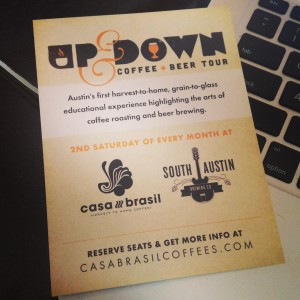 Fortunately for those of us stuck at Coffee 101, Joel has taken all of that knowledge and shares it freely on his website. He also co-hosts a great event called Up & Down Tour, with the guys at South Austin Brewing Co. You begin the day with coffee, lunch is served midway and wrap up with beer. And all day you’re learning about coffee and beer and the brew methods of each. It only happens once a month, and it’s limited to about 15 people. I encourage you to check it out!
Fortunately for those of us stuck at Coffee 101, Joel has taken all of that knowledge and shares it freely on his website. He also co-hosts a great event called Up & Down Tour, with the guys at South Austin Brewing Co. You begin the day with coffee, lunch is served midway and wrap up with beer. And all day you’re learning about coffee and beer and the brew methods of each. It only happens once a month, and it’s limited to about 15 people. I encourage you to check it out!
Joel is an “all in” sort of guy. It’s clear that when he’s into something, he’s immersed. So it’s not much of a surprise when I ask him what he’d earn his living doing if happiness were the national currency and he tells me he’d continue to do what he’s doing. It’s not so much that coffee is the only thing that he finds fulfilling, it’s more that Joel is the kind of person who understands the power of focus. Like Malcolm Gladwell showed us in his book Outliers, when you devote a substantial amount of time to something – 10,000 hours let’s say, you become an expert. You move from merely being interested, to being exceptional. Joel has achieved that status and then some.
Joel admits that from a purely business perspective, he probably could be doing things differently. Joel operates from a place of passion, not profit. He wants to put forth the best coffee experience. He also operates from a place of responsibility. He knows he could pay less for the coffee beans he buys. He could cut corners and be more profitable and, he admits, probably no one would notice. But Joel would. And he’s not in this business to give people a cup of rocket fuel to power their day. For Joel, coffee is not “go juice”. It’s an experience to be savored, shared and when done right, is soul satisfying.
Joel and his wife Lisiane, who is also a part of the Casa Brasil Coffees story and business, are committed to sustainable business practices which includes having almost familial type relationships with the coffee farmers they buy from. Joel talks to me about transparency in business and how one of his pillars is truth and openness with everyone. He creates a spreadsheet that tracks all the business expenses and profits and he shares the documents with the farmers. As a result, they know, to the penny, how much Joel is spending to turn the green coffee beans he buys from them into the rich, complex, exquisite coffees he sells to fine dining establishments around Austin, and lucky for us, via the Casa Brasil website.
Joel is quick to mention that his business model has nothing to do with pity for the poor coffee farmers. He says the idea of a smart, white American coming in and teaching the native people of Brazil (0r any country) about how to properly run a business growing coffee (or any crop or business) is ridiculous. But that’s the story the media buys from PR departments and we consumers eat it up. Somehow it makes us feel good to buy something that helps someone else. It’s the reason Fair Trade has become a hot label to slap onto something, allowing for a 50% or more markup in the process. A price increase that is likely fattening the pockets of business owners, not the farmers.
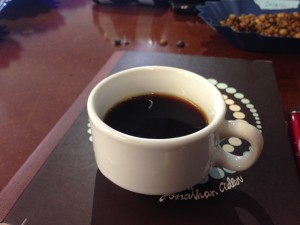
Joel’s position is not that we shouldn’t want our money to be doing good and offering benefit to others. It’s not the “helping others” part that’s flawed. It’s the idea that they need our help and we should have pity on them. Supporting the coffee farmers with pay that’s equitable and fair is sustainable and it’s the right thing to do. That’s Joel’s philosophy. And it’s how he gets access to the best coffee the country has to offer. As I mentioned earlier, I had the privilege of enjoying a few cups of the coffee that was just named the 5th best coffee in Brazil. And it was fantastic!
I asked Joel about a ritual or practice he does every day that contributes to his overall success. Here’s what he had to say, “I would say keeping my coffee as a ritual is a key thing for me. I try to make sure that it doesn’t turn into a fuel for me, that I take time out to enjoy the coffee and to use the brewing and drinking of the coffee as a time-out from the day. It keeps me sane.”
Joel told me something interesting about “going for coffee” in Italy. When Joel was doing the modeling thing in Milan (because that’s how he rolls), he noticed that people would often suggest going for coffee – but what they actually meant by it was, “let’s go connect – share, talk, enjoy each other’s company.” Often it did actually involve drinking coffee, but not always. Sharing a coffee with someone, for me, is a metaphor for making a true connection. Like the coffee, the connection is warm, rich and complex. Good to know Italians agree. ***Interesting random note, Milano is the second-largest city in Italy and the capital of Lombardy. I am also Lombard-y. Ha!
One of my newest, favorite questions (yes, I have my favorites) is, “What is something you believed to be true for a long time, but now know differently?” For Joel, his experience in the coffee business has shed light on the power of marketing. Specifically, how easy it is to be manipulated by the big marketing machines. I tell him I agree and feel like the more I know, the less I know. Joel tells me he’s reminded of the lyrics written by Bob Dylan that say, “I was so much older then, I’m much younger than that now.”
An example Joel gives of the power of marketing is The Bulletproof Coffee guy – Dave Aspry, who warns consumers of mycotoxins in coffee. Oh and guess what? He happens to sell some that is mycotoxin free. (And according to Joel, so does most everyone else. Moldy coffee is not something we need to worry about friends. Thank goodness!) Joel also cites the marketing engine behind The Four-Hour Workweek from Tim Ferris. Joel says that none of us have the time to become experts in everything – so we are left having to trust those who claim to have figured it out. Unfortunately, most of the time what they’ve really figured out, is how to make money. Good for them. Bad for us.
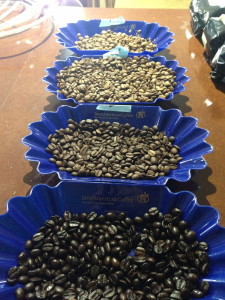
Speaking of marketing, I tell Joel that I once read that Starbucks over roasts their beans on purpose so that they can deliver a consistent product. If they roasted the beans to the level that Joel does, they’d have customers complain about the “acidity” or people would be upset when each cup they ordered tasted just slightly different. In order to give a consistent product, they over roast (burn) the beans and what you’re tasting is actually the burnt flavor.
Joel never once says a disparaging thing about any competitor – including the most well-known coffee vixen on the planet. In fact, he thinks Starbucks does a pretty good job considering the scale of their operation. He does share with me an analogy that I just love. He says coffee roasting is like the ref in a football game. A good ref is one you don’t notice when you’re watching a game. And a good roast is one that doesn’t overpower the real star – the coffee.
When I ask Joel about something about himself that he’d change, he tells me, “I would be better at saying “no”. I try to take on a lot of things at once, and my personal and family time usually are sacrificed, when a simple “no” would have done.”
The best advice Joel ever got came from his dad, who taught him the value of working hard and told him, “Do the best you can do. That’s all you can do.” Joel used to get frustrated when he’d fall short of being “the best”. For instance, when injuries ended his soccer career far too soon, he spent years being frustrated by the disappointment. He’s learned to let go and has given up on comparing himself to others. Instead, he focuses on being his best and knows that by doing so, there really is no competition. There is no other Casa Brasil and no other Joel Shuler.
If given 30 seconds to make a speech to the world, Joel would have this to say, “From my experience, people in different cultures and countries want very similar things. If we focus on how similar we all are and how we share common desires, it is harder for the powers that be to direct us against each other.”
Joel is a reminder to us all that life, like coffee, is not to be devoured, but instead to be savored. “Going for coffee”, or connecting with people is where the magic in life happens. When we take the time to really connect with someone – to know them and to understand them, we do business with them differently. Return on investment isn’t about dollars and cents, but is measured by how many children of coffee farmers got a college education as a result of our partnership. How many people advance as we move forward? Joel makes us consider, what would happen if we focused less on maximizing profitability and instead focused on maximizing relationships?
Joel also reminds us that we can become experts in anything that matters – we just need to put in the hours. When you work hard and do the best you can, it’s always enough. There are no competitors because there is not another you on the planet. Finally, Joel reminds us when things don’t go exactly as planned, you’ve got to learn to let it go.
All is fine, after all. All is always fine.
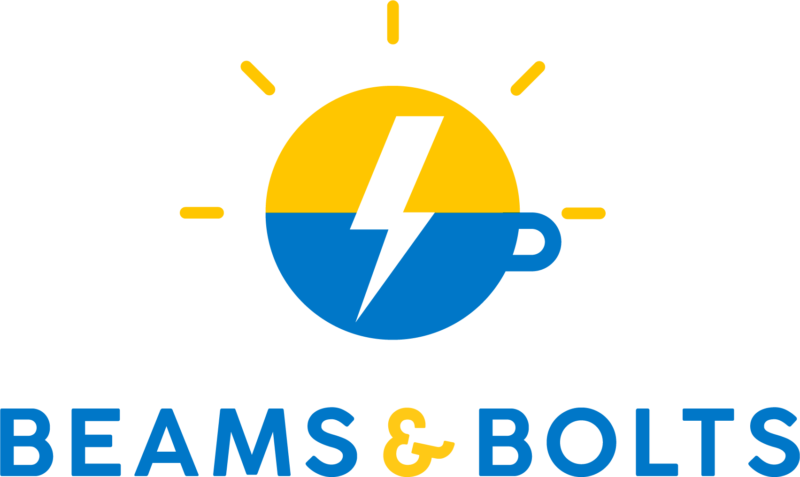
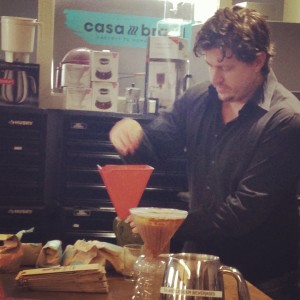
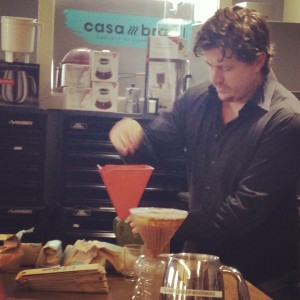
Melissa,
What an incredible undertaking! Thanks so much for letting me be a part of it.
Joel
Absolutely! Loved hearing and sharing your imcredible story!